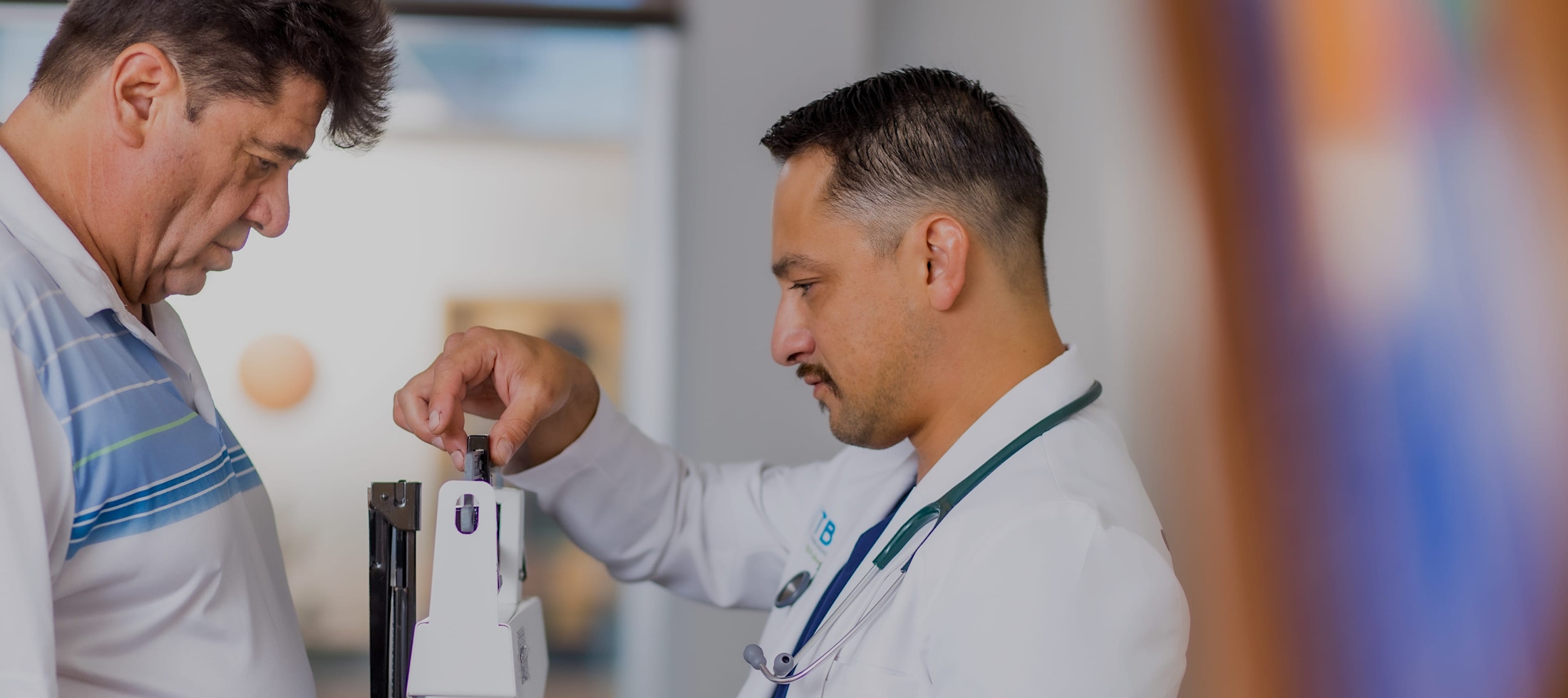Limited-Time Offer
All-Inclusive Gastric Sleeve Package
Starting at $3,750 USD
Available only for surgeries scheduled between June 23 – June 26

Available only for surgeries scheduled between June 23 – June 26
Many patients struggle with weight gain after bariatric surgery. Weight gain following bariatric surgery is more common than you think. Sometimes, even successful patients struggle. According to the American Society for Metabolic and Bariatric Surgery, about 50% of bariatric patients regain 5% of their excess body weight within two years after surgery. Some gain even more. Not letting gradual weight gain overtake your life is crucial. At Tijuana Bariatric Center, our medical and nutritional staff stand ready to help patients frustrated with unexpected weight gain after bariatric surgery at our Tijuana, Mexico, hospital. Whether you need professional advice or are considering revision surgery, our team can help get you back on track. We will separate facts from myths and misconceptions and help you maintain a positive outlook and healthy habits.
Bariatric surgery produces dramatic weight loss: patients often report losing up to 60% to 75% of their starting weight. However, despite these staggering statistics, just as many patients experience a weight plateau or see their weight begin to creep up again months or years after their bariatric procedure.
Several reasons can lead to weight gain. Sometimes, the cause is as simple as a patient slipping in their eating habits or exercise routine. Other times, it may signal post-surgical complications. But weight gain is often just the result of normal physiology. The human body is designed to store energy reserves in case of periods of starvation. Once your body adjusts to its new digestive system, it will begin to maximize energy absorption. As a result, patients often start regaining weight.
Patients may regain as much as eight to ten percent of their original weight.
The amount of weight gain a patient will experience depends mainly on the type of bariatric surgery performed. With purely restrictive surgeries, such as Lap-Band® or gastric sleeve surgery, which reduce intake by reducing stomach capacity, patients may regain as much as 8% to 10% eight of their original weight. In addition to restricting the size of the stomach, malabsorptive surgeries like gastric bypass or duodenal switch surgery change how your system digests the foods you eat. As a result, patients undergoing these types of procedures often regain less excess weight.


Patients can take several measures to limit weight regain even before surgery. One of the most important steps you can take is to change your diet and exercise habits. By starting a restricted diet early, you can ease the stress of change on your body and begin to lose weight before undergoing weight loss surgery. Research shows that the lower a patient’s BMI (body mass index) when they undergo surgery, the less weight they will need to lose and keep off afterward.
If you struggle with addiction or an eating disorder, it is vital that you pursue treatment before bariatric surgery.
Eating disorders, alcoholism, and drug addiction can also complicate your results. All three conditions can interfere with your metabolism, affecting your weight loss and overall health. If you struggle with addiction, it is vital that you pursue treatment before bariatric surgery. Many people fall back into old habits to cope with stress after bariatric surgery, and recovery is stressful enough without other complications.

It is important to understand that even these precautions cannot always prevent weight regain.
If you have noticed weight gain despite your best efforts, several methods can help you get back on track:
Unfortunately, the root of the problem cannot always be dealt with through nonsurgical means. In some cases, revisional bariatric surgery may be necessary.
However, these routes are only recommended as a last resort. For example, your surgeon may perform another procedure if a LAP-BAND® has slipped or if the stomach has stretched out after a gastric sleeve procedure.
The goal of weight loss surgery is to help those suffering from obesity reduce the amount of food they eat to steadily lose weight and achieve a healthier life. Although procedures such as gastric bypass and gastric sleeve surgery significantly lose the amount of food patients can eat by creating a smaller stomach, it is still possible to eat too much food once the digestive system has healed from the procedures. The doctors and nutritional counselors working through the Tijuana Bariatric Center can help frustrated patients undo the effects of overeating after bariatric surgery at a Tijuana, Mexico, hospital. In addition to getting you back on track, we can help patients learn healthy habits and lay the foundations for a fitter lifestyle.

Eating more food than necessary is frustratingly easy. Many factors can contribute to the problem, but two are particularly common: poor adjustment and long-established overeating behaviors.
While it might seem counterintuitive, snacking can be an effective way to curb overeating.
Adjusting to the bariatric diet can be difficult for several reasons, ranging from frustration over restrictions on what you can eat to simply misjudging whether or not you are full. Further complicating this problem is a tendency to overeat. Many bariatric patients struggle with limiting their portions, and this habit often contributes to any existing weight issues. In addition to following tips and guidelines, many patients join support groups or online forums to help with binge eating and learning how to eat small portions.
Bariatric surgery dramatically changes the digestive system by creating a small stomach pouch and sometimes altering the small intestine so that the body absorbs fewer calories. Because of these alterations, overeating can result in substantial repercussions. The stomach is physically limited in its capacity, resulting in immediate physical consequences of overeating, including:
Severe discomfort from abdominal cramps is the body's most common response to overeating after weight loss surgery. This side effect can make recovering from surgery difficult. Not only will you not be able to eat as much, but you won't want to after you suffer severe abdominal pain.
Sometimes, after gastric sleeve surgery, the body will reject food outright, resulting in vomiting. However, it can also occur if you eat the wrong foods at the wrong times. Diarrhea can also occur after gastric bypass surgery due to malabsorption as your digestive system tries to process the food you eat.
Dumping syndrome involves severe abdominal pain, vomiting, and diarrhea. This condition, also known as rapid gastric emptying, is triggered by foods, particularly those high in sugar, that move too quickly from the stomach to the duodenum of the small intestine.
These physical side effects can both deter and motivate patients. While highly unpleasant, they give patients a concrete reason for sticking to their diet. However, if you overeat regularly, this discomfort will fade because of the stomach stretching to accommodate more food. Ultimately, sticking to the prescribed diet is up to the patient.
Avoiding the tendency to overeat mainly relies on improving old eating habits. While revisional surgery may be necessary in rare cases, your nutritionist is more likely to recommend the following tips for limiting your caloric intake:

The doctors and counselors coordinating with the Tijuana Bariatric Center are dedicated to ensuring the best possible results for every patient who undergoes gastric bypass, gastric sleeve, or one of our other bariatric procedures. Contact the network today at 1-800-970-0577 to take advantage of our post-surgical support and counseling.
